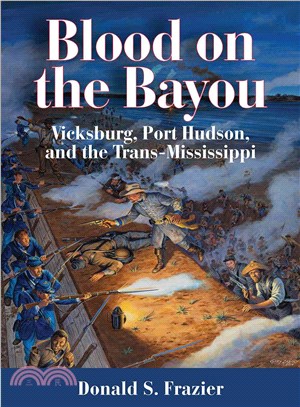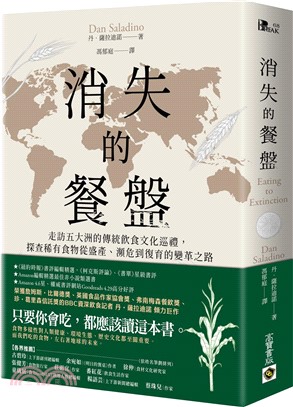Blood on the Bayou ─ Vicksburg, Port Hudson, and the Trans-Mississippi
- ISBN13:9781933337630
- 出版社:Texas A & M Univ Pr
- 作者:Donald S. Frazier
- 裝訂/頁數:精裝/498頁
- 規格:23.5cm*15.9cm*3.8cm (高/寬/厚)
- 出版日:2015/02/15
相關商品
商品簡介
作者簡介
商品簡介
Blood on the Bayou: Vicksburg, Port Hudson, and the Trans-Mississippi takes a well-known story, the struggle for control of the Mississippi River in the American Civil War, and recasts it as a contest for control of African-American populations. The Emancipation Proclamation may have freed the slaves, but the task of actually moving these liberated people into the Union lines and directing their labor to the benefit of the Union fell to the Federal army and navy. Control of the Mississippi has often been cast in economic terms. This book, by examining the campaigns from west of the river, shows how the campaign to reduce these Rebel forts also involved the creation of a black army of occupation and a remaking of the social and political landscape of Louisiana and the nation.
This book is new scholarship and, most importantly, fresh research that challenges many commonly held notions of the Vicksburg and Port Hudson campaigns. In the past, the movement of large armies and the grand assaults garnered the most attention. As Blood on the Bayou reveals, small unit actions and big government policies in the Trans-Mississippi did as much to shape the outcome of the war as did the great armies and famous captains of legend and lore. No student of the Civil War should ignore this book. Scholars of Vicksburg and Port Hudson will find their studies incomplete without a thorough examination of this work.
As with the other books in the Louisiana Quadrille series, the military campaigns remain front and center. I trace the movements of obscure regiments and battles fought on unfamiliar trans-Mississippi landscapes in June and July, 1863, and tell a little-known aspect of the sieges of Vicksburg and Port Hudson. I examine the evolution of Federal and Confederate strategy and sketch the leaders tasked with carrying these plans forward. There is enough combat to satisfy even the most ardent student of campaigns and commanders.
The sources, however, revealed an almost obsessive concern over slavery by both sides. Actually, these soldiers, civilians, and politicians did not fret over theinstitution of slavery as much as control over the slaves themselves. Both Federal and Confederate authorities seemed preoccupied with who physically controlled the enslaved population. This led me to review Republican views on this subject, and especially those held by Abraham Lincoln. The tug-of-war over people—whom some considered persons held in bondage and others considered human property—also caused me to reexamine the peculiar institution as a salient feature of Confederate national identity. A greater appreciation for the causes of the war emerged. While states’ rights certainly provided a framework and context for the argument, slavery caused the war, not vice versa.
Physical control of the slave population impacted how the Federal Government conducted the war. When war broke out, slaves emerged first as “contraband,” then morphed into “self-emancipated” persons, before becoming the raison d’etre of the Mississippi Valley campaigns in 1863. The African-Americans became plunder, if you will. I came to the conclusion that the gathering of these persons drove, in part, Union military strategy in the Mississippi Valley. Lincoln wanted slaves removed from southern owners, concentrated in areas convenient to Union logistics centers, and then redistributed to serve as soldiers or farmers on behalf of the United States. The longer the military campaigns in the Mississippi Valley dragged on, the more Federal officials could feed liberated slaves into the system.
This strategy held that, once Union troops had removed slaves from bondage and repurposed them to other tasks, it would be nearly impossible for their former masters to re-enslave them. No matter the outcome of the war, the Federal government set out to break slavery—forever. Fearing a rapid collapse of the Confederacy, abolitionists intended to
This book is new scholarship and, most importantly, fresh research that challenges many commonly held notions of the Vicksburg and Port Hudson campaigns. In the past, the movement of large armies and the grand assaults garnered the most attention. As Blood on the Bayou reveals, small unit actions and big government policies in the Trans-Mississippi did as much to shape the outcome of the war as did the great armies and famous captains of legend and lore. No student of the Civil War should ignore this book. Scholars of Vicksburg and Port Hudson will find their studies incomplete without a thorough examination of this work.
As with the other books in the Louisiana Quadrille series, the military campaigns remain front and center. I trace the movements of obscure regiments and battles fought on unfamiliar trans-Mississippi landscapes in June and July, 1863, and tell a little-known aspect of the sieges of Vicksburg and Port Hudson. I examine the evolution of Federal and Confederate strategy and sketch the leaders tasked with carrying these plans forward. There is enough combat to satisfy even the most ardent student of campaigns and commanders.
The sources, however, revealed an almost obsessive concern over slavery by both sides. Actually, these soldiers, civilians, and politicians did not fret over theinstitution of slavery as much as control over the slaves themselves. Both Federal and Confederate authorities seemed preoccupied with who physically controlled the enslaved population. This led me to review Republican views on this subject, and especially those held by Abraham Lincoln. The tug-of-war over people—whom some considered persons held in bondage and others considered human property—also caused me to reexamine the peculiar institution as a salient feature of Confederate national identity. A greater appreciation for the causes of the war emerged. While states’ rights certainly provided a framework and context for the argument, slavery caused the war, not vice versa.
Physical control of the slave population impacted how the Federal Government conducted the war. When war broke out, slaves emerged first as “contraband,” then morphed into “self-emancipated” persons, before becoming the raison d’etre of the Mississippi Valley campaigns in 1863. The African-Americans became plunder, if you will. I came to the conclusion that the gathering of these persons drove, in part, Union military strategy in the Mississippi Valley. Lincoln wanted slaves removed from southern owners, concentrated in areas convenient to Union logistics centers, and then redistributed to serve as soldiers or farmers on behalf of the United States. The longer the military campaigns in the Mississippi Valley dragged on, the more Federal officials could feed liberated slaves into the system.
This strategy held that, once Union troops had removed slaves from bondage and repurposed them to other tasks, it would be nearly impossible for their former masters to re-enslave them. No matter the outcome of the war, the Federal government set out to break slavery—forever. Fearing a rapid collapse of the Confederacy, abolitionists intended to
作者簡介
DONALD S. FRAZIER is the award-winning author of Blood and Treasure; Cottonclads!; Fire in the Cane Field; and Thunder Across the Swamp. His other work include serving as co-author ofFrontier Texas and editor of Love and War: The Civil War Letters and Medicinal Book of Augustus V. Ball. Donald lives in Abilene, Texas with his wife Susan and his two daughters. Donald is currently a Professor of History at McMurry University.
主題書展
更多主題書展
更多書展本週66折
您曾經瀏覽過的商品
購物須知
外文書商品之書封,為出版社提供之樣本。實際出貨商品,以出版社所提供之現有版本為主。部份書籍,因出版社供應狀況特殊,匯率將依實際狀況做調整。
無庫存之商品,在您完成訂單程序之後,將以空運的方式為你下單調貨。為了縮短等待的時間,建議您將外文書與其他商品分開下單,以獲得最快的取貨速度,平均調貨時間為1~2個月。
為了保護您的權益,「三民網路書店」提供會員七日商品鑑賞期(收到商品為起始日)。
若要辦理退貨,請在商品鑑賞期內寄回,且商品必須是全新狀態與完整包裝(商品、附件、發票、隨貨贈品等)否則恕不接受退貨。
定價:100
1400
無庫存,下單後進貨
(到貨天數約30-45天)
(到貨天數約30-45天)
























